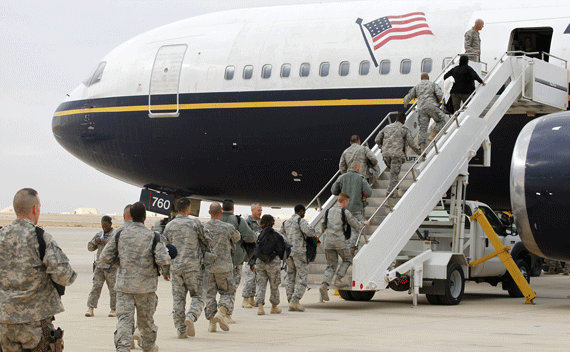Guest Post: Linda Robinson on the End of the Iraq War
More on:

I woke up this morning to an email inbox full of news alerts announcing that the United States has formally ended the war in Iraq. The eight-and-a-half year-long war cost more than $800 billion and resulted in tens of thousands of casualties, including more than 4,500 American deaths and many times that number of Iraqi deaths. My colleague Linda Robinson, a long-time reporter for U.S. News & World Report and a best-selling author, covered the war. She kindly agreed to offer her thoughts on the lowering of the American battle flag in Baghdad and to reflect on what comes next.
A little over three years ago, I published a book about the Iraq war entitled Tell Me How This Ends. The final chapter outlined a list of the issues that would have to be resolved for the conflict to reach a successful conclusion—things like the resolution of the status of Kirkuk and Arab-Kurd tensions, the full incorporation of the Sunni minority into the political life of the new Iraq, and a hydrocarbon law to govern the management of Iraq’s most important resource. An internally stable Iraq would also signal to Iran and the Gulf states that it would be an even-handed partner in the search for regional stability.
None of those things has happened. Of course it is up to the Iraqis, first and foremost, to chart their way ahead. I believed then, and still believe, that robust U.S. and regional diplomacy is needed to help resolve these issues. Iraq has always been and will remain a significant country in a critical region. As part of such an effort, military diplomacy also has a role to play, and it is to be hoped that that role might be greater than the current very minimal support tied to sale of military hardware.
This week the Obama administration is marking the withdrawal of U.S. troops from Iraq and the initiation of a new era in U.S.-Iraqi relations on January 1, to be governed by the still-to-be-fleshed out Strategic Framework Agreement. The military relationship for the moment is very thin: 157 uniformed U.S. military personnel will occupy the Office of Security Cooperation (OSC), headed by Lt. Gen. Robert Caslen. At the moment, the office will oversee execution of military sales and the associated training on equipment, to include the M1A1 Abrams tank and F-16 fighter jets. That training will be very limited.
Most U.S. military officers who have served in Iraq over the past nine years understand almost instinctively why it would be a good idea for the United States to develop a more robust training and assistance relationship with Iraq. Quite simply, it is in the interest of both countries. Those interests can be enumerated as follows:
1) Iraq’s military needs combined arms training at the brigade and division level, and air defenses. Training relationships have historically been an important component of U.S. relationships with other countries. U.S. ties with Arab military officers played an important role in the Arab Spring events.
2) Iraq’s internal politics are still precarious. Prime Minister Maliki has not honored the agreement to appoint opposition Sunni and secular party representatives to key national security cabinet positions, and many military officers have recently been fired and/or arrested. The presence of U.S. trainers and advisers could provide an informal but powerful influence to help knit together the country’s sectarian cleavages.
3) Understanding the evolution and internal dynamics of the Iraqi state, to include its security forces, will remain an important U.S. objective. A training and assistance relationship can provide extremely useful insights into Iraq’s evolution and its posture vis-à-vis Iran, Syria, Jordan and the Persian Gulf states.
4) A training and assistance presence will telegraph to all of those parties that Iraq intends to maintain a balanced regional policy and thus forestall a counterproductive cycle of instability as Iran seeks to increase its influence and Persian Gulf states react.
5) Realistic in-country training exercises also provide training benefits to the U.S. military, and such opportunities take on increased importance as conventional forces end their combat role in Afghanistan.
U.S. military officers have told me that this training and assistance relationship can be carried out by troops rotating in from Kuwait for short periods. If they are conducting training exercises on installations such as the Besmaya training center, the prospect for any type of incidents will be extremely low, and many of them believe a memorandum of understanding would be sufficient to safeguard troops. Over time most of Iraq’s parties may be willing to support the immunity arrangements required for a status of forces agreement. Another shorter term, albeit less preferable alternative is for regional allies such as Jordan to enter Iraq to conduct the training. A third alternative is for Iraqi troops to go abroad for training. But neither of these alternatives provides the in-country presence, influence and insight that training and assistance inside Iraq will provide to the United States. Even in the tight budget era ahead, U.S. troops will still be abroad and will still need to train; this is one of the missions that makes geopolitical sense. U.S. officials have told me that Iraq would like such a training relationship; if the U.S. administration fully appreciates the value that it will provide to U.S. foreign policy and security interests in a volatile and important part of the world, it will resume its efforts to this end in short order.
More on:
 Online Store
Online Store